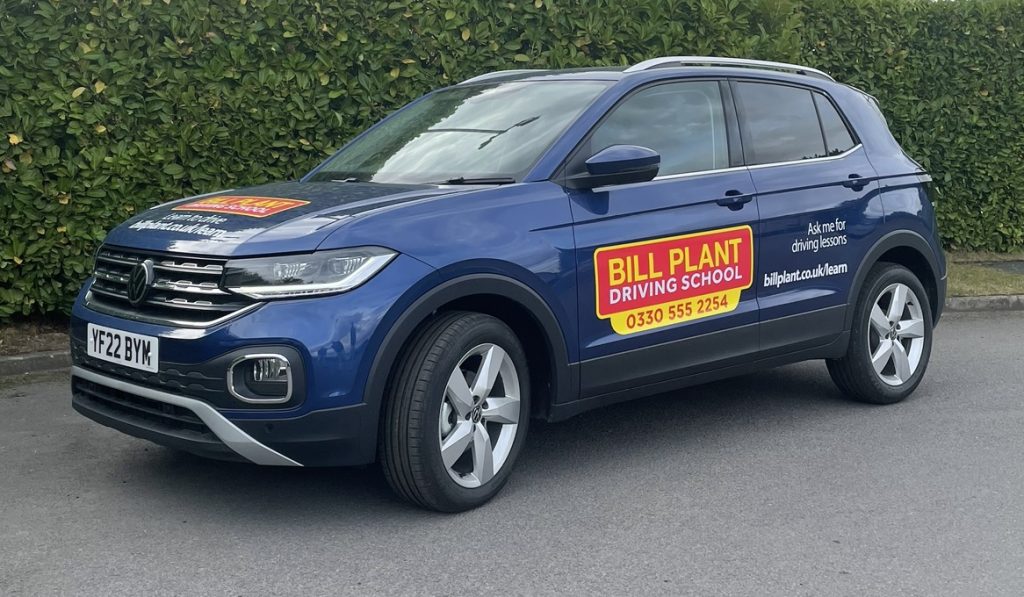So, you’re thinking of becoming a driving instructor and wanting to know what the first steps are. Well, it should be no surprise to know that you must pass several checks before you can start your driving instructor training. This is because you’re responsible for the safety of your students.
To prove your reliability, the DVSA requires the Disclosure and Barring Service to conduct an enhanced DBS check. But what does this mean, exactly? And what does the process entail?
In this article, we’ll explore driving instructor DBS checks and their purpose. We’ll also discuss the requirements surrounding getting a criminal record check to become a driving instructor and whether a criminal record could prevent you from pursuing this career path.

What is a driving instructor DBS check?
A DBS check, sometimes referred to as a criminal record check, is an assessment that provides the DVSA with a history of an applicant’s criminal record. The purpose of checking someone’s criminal history is to ensure the safety of young people and other vulnerable individuals that driving instructors may come into contact with as part of their job.
DBS checks aren’t just a requirement for driving instructors; employers in all industries can request full criminal record checks for existing or prospective employees to verify their suitability for a particular position.
This check examines any possible criminal record you may have and must be done through the Disclosure and Barring Service.
The DVSA will usually check for any previous motoring offences, driving disqualifications, non-motoring offences, penalty points on your driving licence, and pending court proceedings. These checks can be grouped into consideration factors and the relevant offences that may disqualify you from becoming a driving instructor.
Why do driving instructors need criminal record checks?
Being a driving instructor is an occupation that involves a lot of responsibility in a number of areas. Here are some reasons why driving instructors must have criminal record checks.
- Ensuring the safety of students
When someone is learning to drive, they need to know that they are in safe hands. Criminal record checks serve to ensure the safety of students who, ultimately, are in a vulnerable position whenever they enter your training vehicle.
By screening potential driving instructors for past criminal convictions, the authorities can control the situation and protect the well-being of learner drivers by ensuring they aren’t left alone with an instructor whose past may be cause for concern.
- Upholding the industry’s professional reputation
The driving instructor industry benefits from maintaining a positive and trustworthy reputation, upheld by high standards and led by reliable, knowledgeable people. Criminal record checks help the DVSA to maintain its commitment to providing positive, safe learning environments that enable learners to pass their driving tests with flying colours.
- Maintaining public trust and confidence
When you’re teaching someone to drive, it isn’t just you and the student. You’re working in public spaces with pedestrians and other road users. Driving instructors have a responsibility to teach individuals how to operate vehicles safely on public roads. By conducting criminal record checks, licensing bodies can help to protect the public from potential hazards.
Their assessments ensure that only individuals with appropriate backgrounds and no history of severe criminal activity are actively working as approved driving instructors.
It’s important to note that the specific requirements for criminal record checks may vary between jurisdictions. However, the underlying objective remains the same – to ensure the safety and well-being of driving students and maintain public trust in the profession of driving instruction.
How to apply for a DBS check
If you’re thinking about becoming a driving instructor, or are working as an approved driving instructor (ADI) already and need to renew your DBS certificate, there are dedicated GOV.UK forms to complete. These are different from the standard DBS check forms, so make sure you’re using the correct one for your personal circumstances.
If you want to become a driving instructor, you’ll need to complete the online form here.
Existing driving instructors will need to get a new DBS check to renew their registration here.
Once you have completed your form, you must head to a post office that offers an ID verification service. You’ll need to make sure you’ve got at least three valid forms of ID.
You can take the following documents with you to complete your application:
- Your driving licence
- Your passport
- A recent bank statement that is less than three months old
- A recent utility bill that is less than three months old
Remember to take a printed version of the online application with the necessary barcodes. This page can be found and printed when you complete your online application.
What does a driving instructor DBS check look for?
The DVSA assesses a candidate’s criminal record, motoring offences and non-motoring offences so that the general public can remain confident that they’ll be learning to drive in a safe environment.
Criminal record checks
The DVSA has several factors that they need to consider before you can become a PDI or ADI. These factors assess the potential risk you may pose to vulnerable people, such as children and other groups you may be working with during driving lessons.
If you have previous convictions or warnings, the DVSA will assess their relevance to your ability to interact with and teach students. They will also consider the seriousness of the offence and the circumstances in which it occurred. This helps them determine whether or not you pose a threat to others.
Previous offences don’t always disqualify you from becoming a driving instructor. Rather, the DVSA fairly evaluates whether you have worked towards rectifying your offences. They also examine whether it was a stand-alone offence or part of a series of offences.
Motoring offences
Although the DVSA may not automatically refuse you for having previous offences, certain circumstances can result in immediate refusal. For example, having six or more penalty points on your licence at the time of application or driving under the influence are automatic refusals.
Additionally, if you have been disqualified from driving within the last four years, you won’t be able to qualify as a driving instructor. The same applies if you have a single fixed penalty notice with five or more penalty points.
These cautions or offences will be reported in a Disclosure and Barring Service check, eliminating the possibility of training to become a driving instructor.
Non-motoring offences
Although motoring violations are often more pertinent in the case of driving instructors, some non-motoring offences may appear on an enhanced DBS check. If the Disclosure and Barring Service register any of the following offences, you will be rejected from the ADI register.
These offences or non-motoring cautions include:
- Providing illegal instruction (this includes taking money for driving lessons without a trainee licence)
- Being banned from working with children under the age of 18
- Being on a sex offender register or having been previously convicted of a sexual offence
- Having convictions for theft, drugs, fraud or assault
What happens after a DBS check?

Once you have applied for your DBS check, the DVSA will assess your report and they will determine whether any of your potential offences will affect your ability to work with children and vulnerable groups.
You’ll use your DBS check as part of your application to the DVSA to obtain a Personal Reference Number (PRN), which enables you to book your driving instructor training exams. A PRN is only supplied to a trainee if they are deemed a ‘fit and proper person’ by the DVSA, and is used throughout your career as a driving instructor.
Once you’ve passed your DBS check, having got a PRN and completed the first two stages of your training, you can apply for a potential driving instructor (PDI) licence.
However, if the offences are severe, they may reject your application to become a driving instructor. Although you may reapply for a DBS check, you will likely still be rejected unless your criminal record is scrubbed clean.
If you have any previous offences, they will be removed from your record after 11 years. They may also be removed if you didn’t serve a prison sentence for your crime or if the offence was unspecified.
If the DVSA suspects that your previous offences may pose a threat to any of your students as a driving instructor, your application will be rejected, and you will need to seek alternative employment.
How long does a DBS check take for a driving instructor?
Whether driving instructors are applying for registration for the first time or re-registering as an ADI, it’s recommended to apply for an enhanced DBS check as soon as you begin your driving instructor training.
Enhanced DBS checks and the resulting certificates or reports typically take up to 6 weeks, but may take longer, depending on certain circumstances. It’s always better to be safe than sorry and get your check done in good time.
While you can start learning to become a driving instructor straight away while you’re waiting for your DBS check, you can’t sit your exams until you’ve passed this – so all trainees are advised to start the application process as soon as possible.
What else do you need to become a driving instructor?
Besides having a certificate for an enhanced DBS check, you must fulfil a few other criteria. These factors will determine whether you’re eligible to become a driving instructor, and include:
- Being aged 21 or above
- Having less than six penalty points on your licence,
- Holding a valid UK driving licence for at least three years.
If you’re interested in making this your career, take a look at Bill Plant Driving School’s guide on what you need to become a driving instructor.
FAQs about driving instructor DBS checks
How long does a DBS check last for a driving instructor?
ADI registrations last four years. When you re-apply for this, you must also reapply and pass a DBS check. You will receive an email before your ADI registration date to reapply for a DBS check.
Can I be a driving instructor with a criminal conviction?
The DVSA will assess the risk you pose to students based on the infraction on your record before making a decision. You must provide them with an enhanced DBS certificate and further documentation if necessary.
The DVSA will consider the following:
- The relevance, circumstances and seriousness of your offence
- If you have taken steps to alter your situation
- If you have committed multiple offences
Is a criminal record check the same as a DBS check?
Yes, the process of checking someone’s criminal history is carried out by the Disclosure and Barring Service and, as such, is known as a DBS check.
What is the difference between a DBS and CRB check?
Up until 2012, criminal record checks were referred to as CRB checks, since they were carried out by the Criminal Records Bureau. When the CRB merged with the Independent Safeguarding Authority (ISA) to form the Disclosure and Barring Service, these checks were renamed as DBS checks.

